MgMT20144 - Business & Management Context: Annotated Bibliography
VerifiedAdded on 2023/06/09
|10
|2081
|204
Annotated Bibliography
AI Summary
This annotated bibliography explores key contextual factors influencing business decision-making. It examines organizational governance, highlighting the impact of external governance mechanisms on CEO behavior and strategic investment. The bibliography also addresses environmental factors, specifically focusing on the adoption of SaaS in small businesses and the influence of competitive pressure and government support. Furthermore, it analyzes managerial risk-taking, emphasizing its importance for competitive advantage and the need for comprehensive risk assessment. Business practices such as open innovation and external knowledge sourcing in SMEs are also discussed, along with the functions of diverse firms and the role of political networking in emerging markets. The report concludes that these contextual factors significantly impact organizational performance and decision-making, recommending that CQUniversity prioritize organizational governance for optimal outcomes. Desklib offers a platform for students to access similar solved assignments and resources.
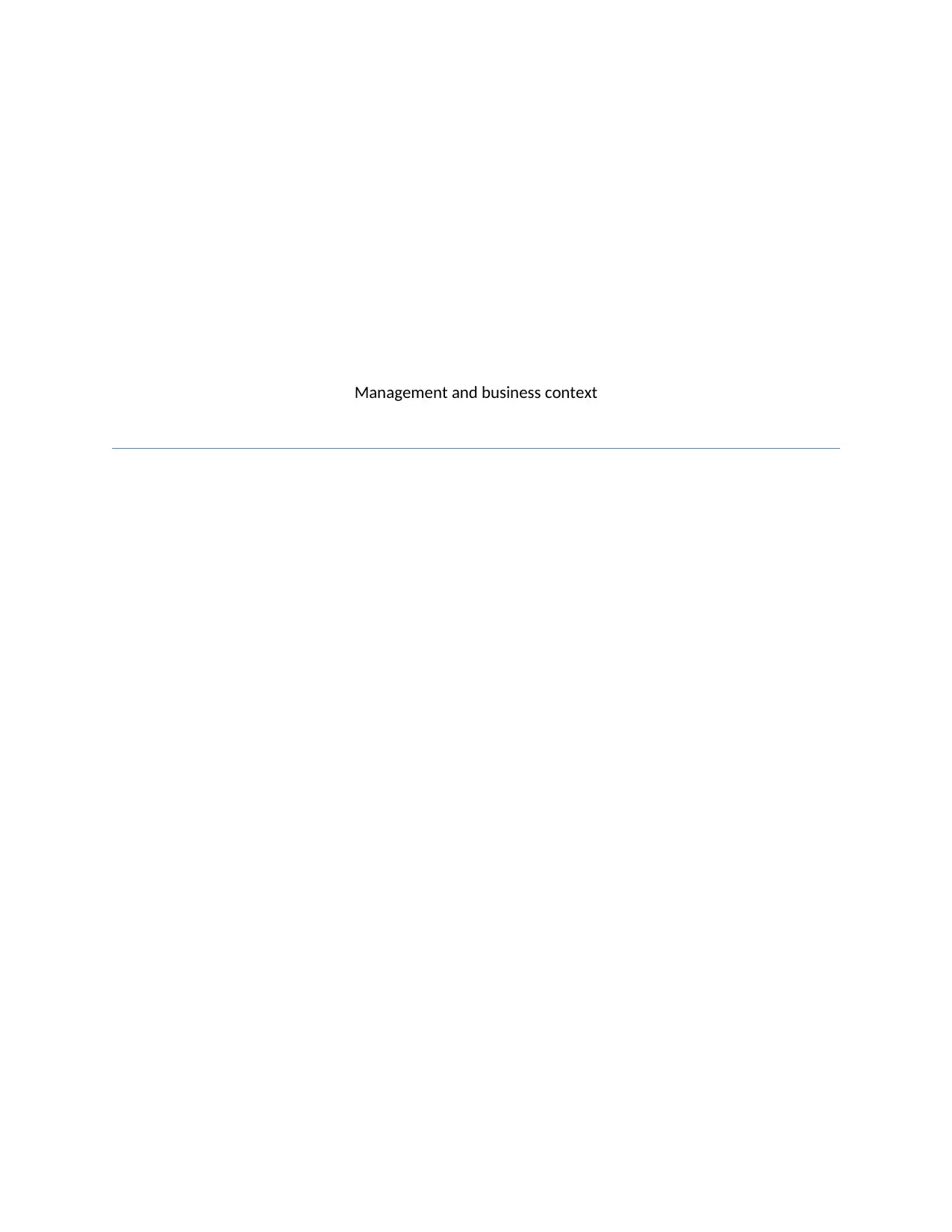
Management and business context
Paraphrase This Document
Need a fresh take? Get an instant paraphrase of this document with our AI Paraphraser
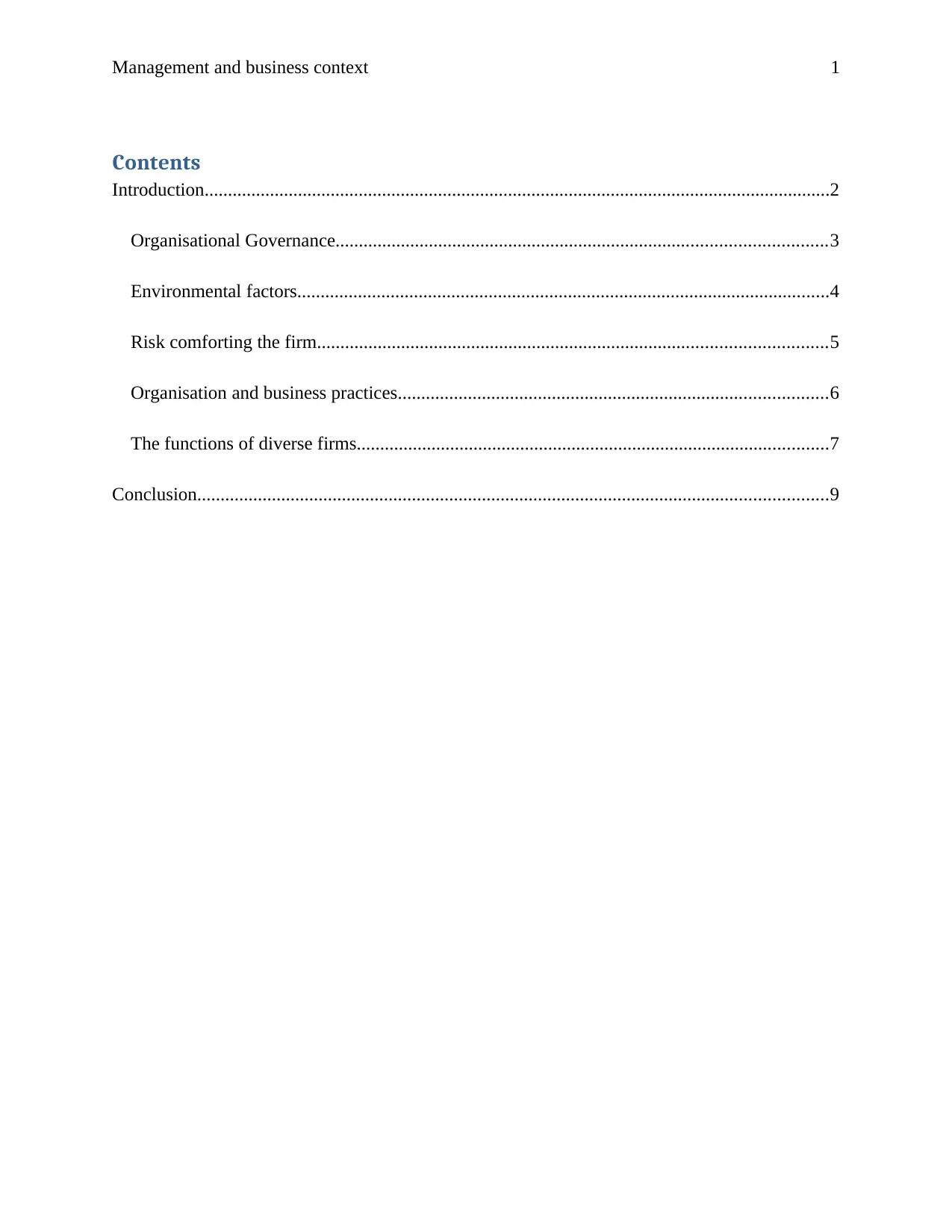
Management and business context 1
Contents
Introduction......................................................................................................................................2
Organisational Governance.........................................................................................................3
Environmental factors..................................................................................................................4
Risk comforting the firm.............................................................................................................5
Organisation and business practices............................................................................................6
The functions of diverse firms.....................................................................................................7
Conclusion.......................................................................................................................................9
Contents
Introduction......................................................................................................................................2
Organisational Governance.........................................................................................................3
Environmental factors..................................................................................................................4
Risk comforting the firm.............................................................................................................5
Organisation and business practices............................................................................................6
The functions of diverse firms.....................................................................................................7
Conclusion.......................................................................................................................................9
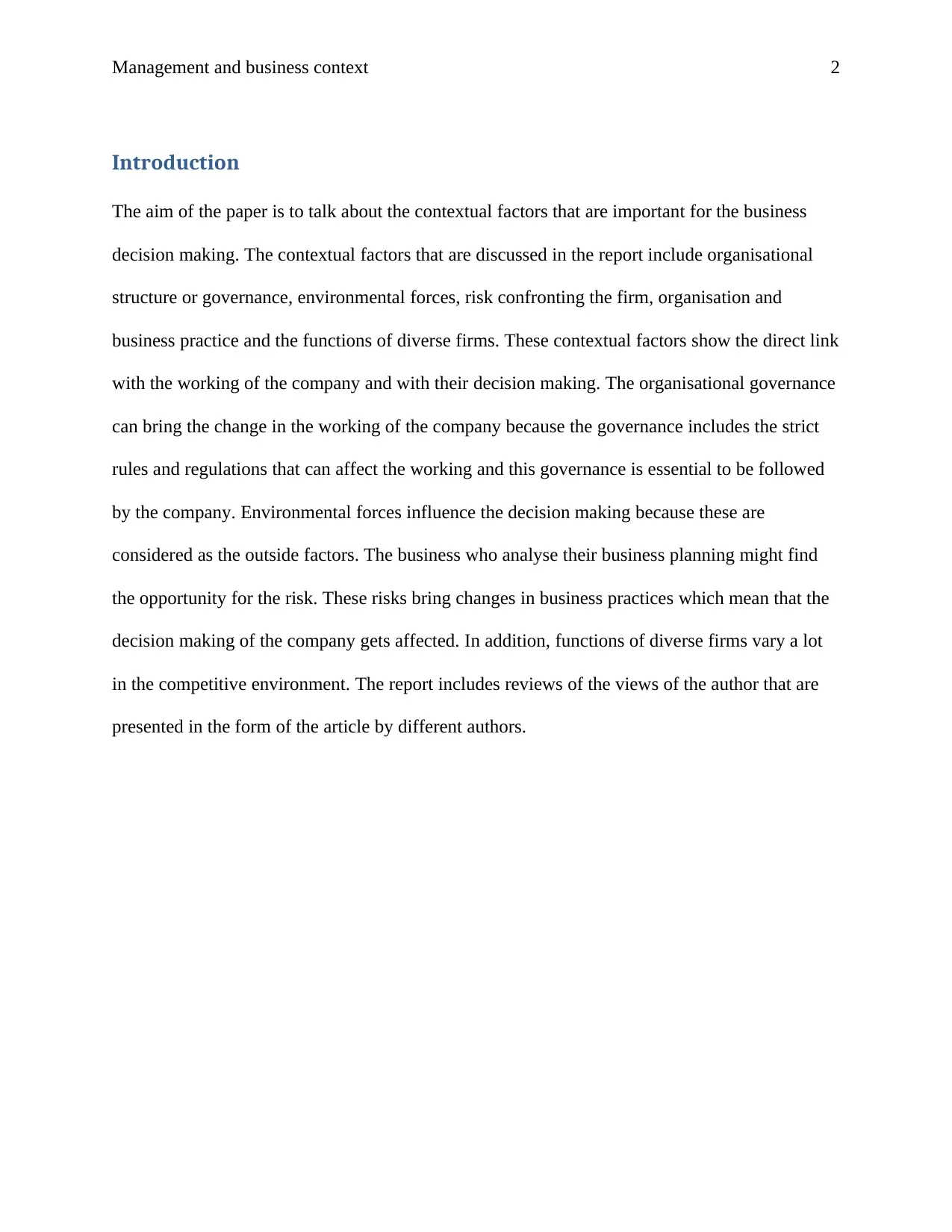
Management and business context 2
Introduction
The aim of the paper is to talk about the contextual factors that are important for the business
decision making. The contextual factors that are discussed in the report include organisational
structure or governance, environmental forces, risk confronting the firm, organisation and
business practice and the functions of diverse firms. These contextual factors show the direct link
with the working of the company and with their decision making. The organisational governance
can bring the change in the working of the company because the governance includes the strict
rules and regulations that can affect the working and this governance is essential to be followed
by the company. Environmental forces influence the decision making because these are
considered as the outside factors. The business who analyse their business planning might find
the opportunity for the risk. These risks bring changes in business practices which mean that the
decision making of the company gets affected. In addition, functions of diverse firms vary a lot
in the competitive environment. The report includes reviews of the views of the author that are
presented in the form of the article by different authors.
Introduction
The aim of the paper is to talk about the contextual factors that are important for the business
decision making. The contextual factors that are discussed in the report include organisational
structure or governance, environmental forces, risk confronting the firm, organisation and
business practice and the functions of diverse firms. These contextual factors show the direct link
with the working of the company and with their decision making. The organisational governance
can bring the change in the working of the company because the governance includes the strict
rules and regulations that can affect the working and this governance is essential to be followed
by the company. Environmental forces influence the decision making because these are
considered as the outside factors. The business who analyse their business planning might find
the opportunity for the risk. These risks bring changes in business practices which mean that the
decision making of the company gets affected. In addition, functions of diverse firms vary a lot
in the competitive environment. The report includes reviews of the views of the author that are
presented in the form of the article by different authors.
⊘ This is a preview!⊘
Do you want full access?
Subscribe today to unlock all pages.

Trusted by 1+ million students worldwide
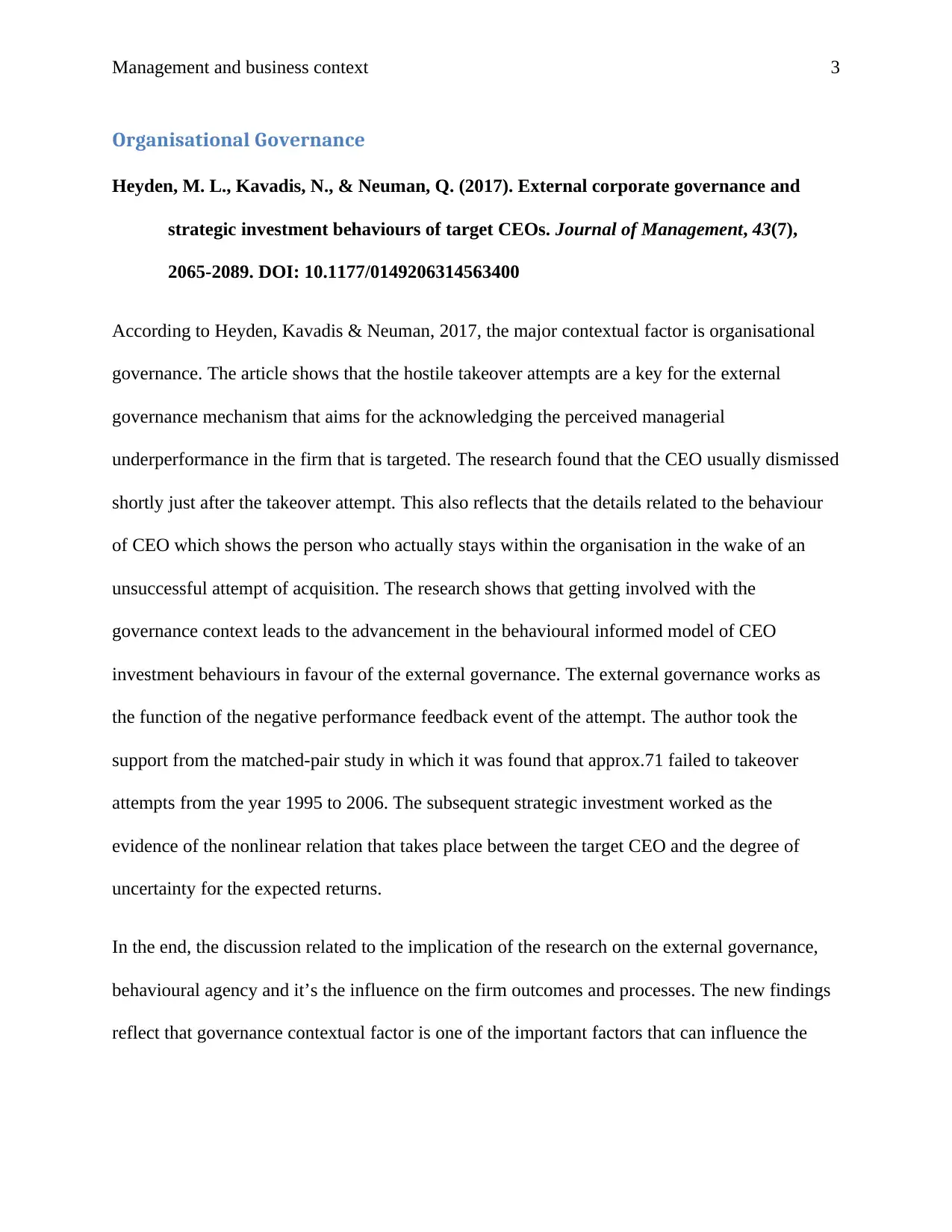
Management and business context 3
Organisational Governance
Heyden, M. L., Kavadis, N., & Neuman, Q. (2017). External corporate governance and
strategic investment behaviours of target CEOs. Journal of Management, 43(7),
2065-2089. DOI: 10.1177/0149206314563400
According to Heyden, Kavadis & Neuman, 2017, the major contextual factor is organisational
governance. The article shows that the hostile takeover attempts are a key for the external
governance mechanism that aims for the acknowledging the perceived managerial
underperformance in the firm that is targeted. The research found that the CEO usually dismissed
shortly just after the takeover attempt. This also reflects that the details related to the behaviour
of CEO which shows the person who actually stays within the organisation in the wake of an
unsuccessful attempt of acquisition. The research shows that getting involved with the
governance context leads to the advancement in the behavioural informed model of CEO
investment behaviours in favour of the external governance. The external governance works as
the function of the negative performance feedback event of the attempt. The author took the
support from the matched-pair study in which it was found that approx.71 failed to takeover
attempts from the year 1995 to 2006. The subsequent strategic investment worked as the
evidence of the nonlinear relation that takes place between the target CEO and the degree of
uncertainty for the expected returns.
In the end, the discussion related to the implication of the research on the external governance,
behavioural agency and it’s the influence on the firm outcomes and processes. The new findings
reflect that governance contextual factor is one of the important factors that can influence the
Organisational Governance
Heyden, M. L., Kavadis, N., & Neuman, Q. (2017). External corporate governance and
strategic investment behaviours of target CEOs. Journal of Management, 43(7),
2065-2089. DOI: 10.1177/0149206314563400
According to Heyden, Kavadis & Neuman, 2017, the major contextual factor is organisational
governance. The article shows that the hostile takeover attempts are a key for the external
governance mechanism that aims for the acknowledging the perceived managerial
underperformance in the firm that is targeted. The research found that the CEO usually dismissed
shortly just after the takeover attempt. This also reflects that the details related to the behaviour
of CEO which shows the person who actually stays within the organisation in the wake of an
unsuccessful attempt of acquisition. The research shows that getting involved with the
governance context leads to the advancement in the behavioural informed model of CEO
investment behaviours in favour of the external governance. The external governance works as
the function of the negative performance feedback event of the attempt. The author took the
support from the matched-pair study in which it was found that approx.71 failed to takeover
attempts from the year 1995 to 2006. The subsequent strategic investment worked as the
evidence of the nonlinear relation that takes place between the target CEO and the degree of
uncertainty for the expected returns.
In the end, the discussion related to the implication of the research on the external governance,
behavioural agency and it’s the influence on the firm outcomes and processes. The new findings
reflect that governance contextual factor is one of the important factors that can influence the
Paraphrase This Document
Need a fresh take? Get an instant paraphrase of this document with our AI Paraphraser
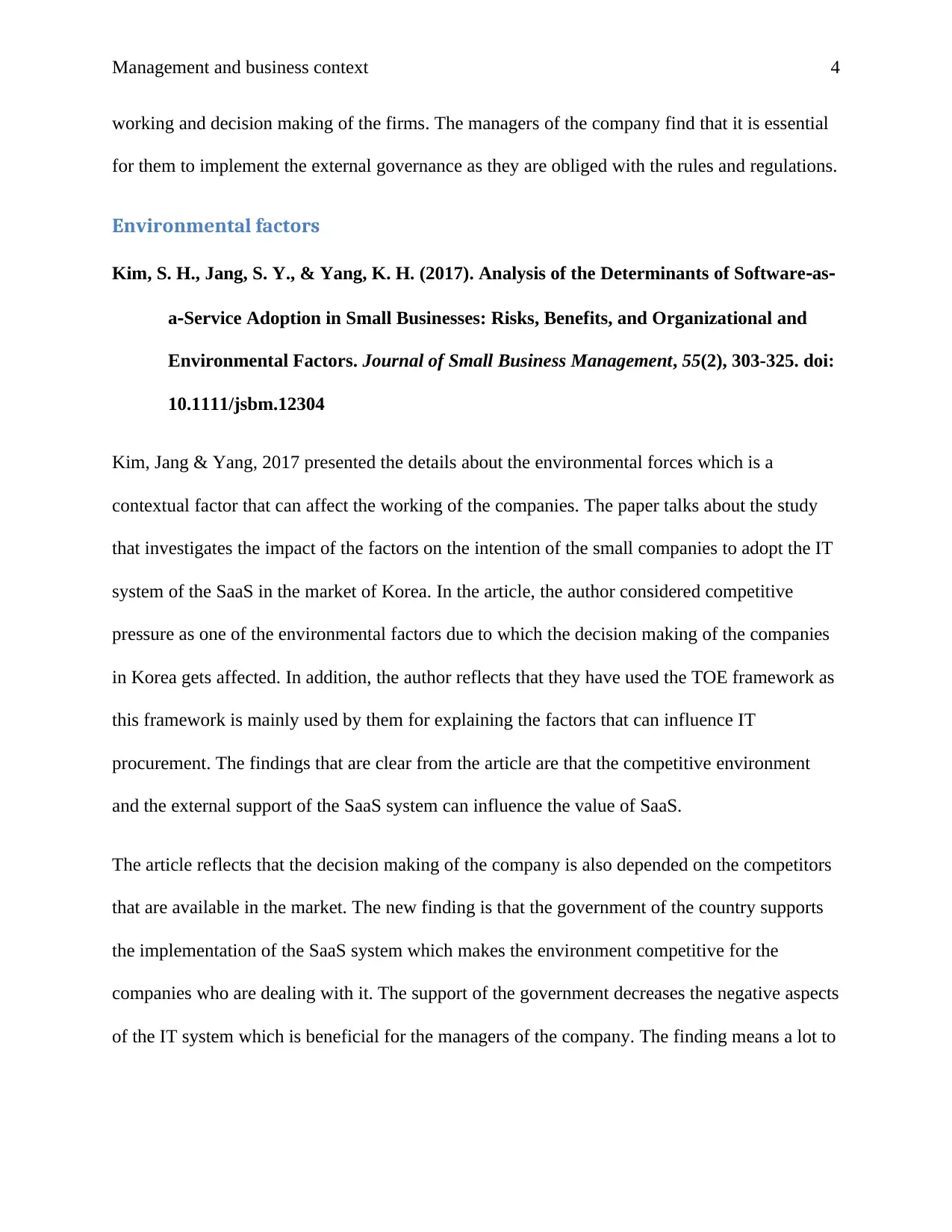
Management and business context 4
working and decision making of the firms. The managers of the company find that it is essential
for them to implement the external governance as they are obliged with the rules and regulations.
Environmental factors
Kim, S. H., Jang, S. Y., & Yang, K. H. (2017). Analysis of the Determinants of Software‐as‐
a‐Service Adoption in Small Businesses: Risks, Benefits, and Organizational and
Environmental Factors. Journal of Small Business Management, 55(2), 303-325. doi:
10.1111/jsbm.12304
Kim, Jang & Yang, 2017 presented the details about the environmental forces which is a
contextual factor that can affect the working of the companies. The paper talks about the study
that investigates the impact of the factors on the intention of the small companies to adopt the IT
system of the SaaS in the market of Korea. In the article, the author considered competitive
pressure as one of the environmental factors due to which the decision making of the companies
in Korea gets affected. In addition, the author reflects that they have used the TOE framework as
this framework is mainly used by them for explaining the factors that can influence IT
procurement. The findings that are clear from the article are that the competitive environment
and the external support of the SaaS system can influence the value of SaaS.
The article reflects that the decision making of the company is also depended on the competitors
that are available in the market. The new finding is that the government of the country supports
the implementation of the SaaS system which makes the environment competitive for the
companies who are dealing with it. The support of the government decreases the negative aspects
of the IT system which is beneficial for the managers of the company. The finding means a lot to
working and decision making of the firms. The managers of the company find that it is essential
for them to implement the external governance as they are obliged with the rules and regulations.
Environmental factors
Kim, S. H., Jang, S. Y., & Yang, K. H. (2017). Analysis of the Determinants of Software‐as‐
a‐Service Adoption in Small Businesses: Risks, Benefits, and Organizational and
Environmental Factors. Journal of Small Business Management, 55(2), 303-325. doi:
10.1111/jsbm.12304
Kim, Jang & Yang, 2017 presented the details about the environmental forces which is a
contextual factor that can affect the working of the companies. The paper talks about the study
that investigates the impact of the factors on the intention of the small companies to adopt the IT
system of the SaaS in the market of Korea. In the article, the author considered competitive
pressure as one of the environmental factors due to which the decision making of the companies
in Korea gets affected. In addition, the author reflects that they have used the TOE framework as
this framework is mainly used by them for explaining the factors that can influence IT
procurement. The findings that are clear from the article are that the competitive environment
and the external support of the SaaS system can influence the value of SaaS.
The article reflects that the decision making of the company is also depended on the competitors
that are available in the market. The new finding is that the government of the country supports
the implementation of the SaaS system which makes the environment competitive for the
companies who are dealing with it. The support of the government decreases the negative aspects
of the IT system which is beneficial for the managers of the company. The finding means a lot to
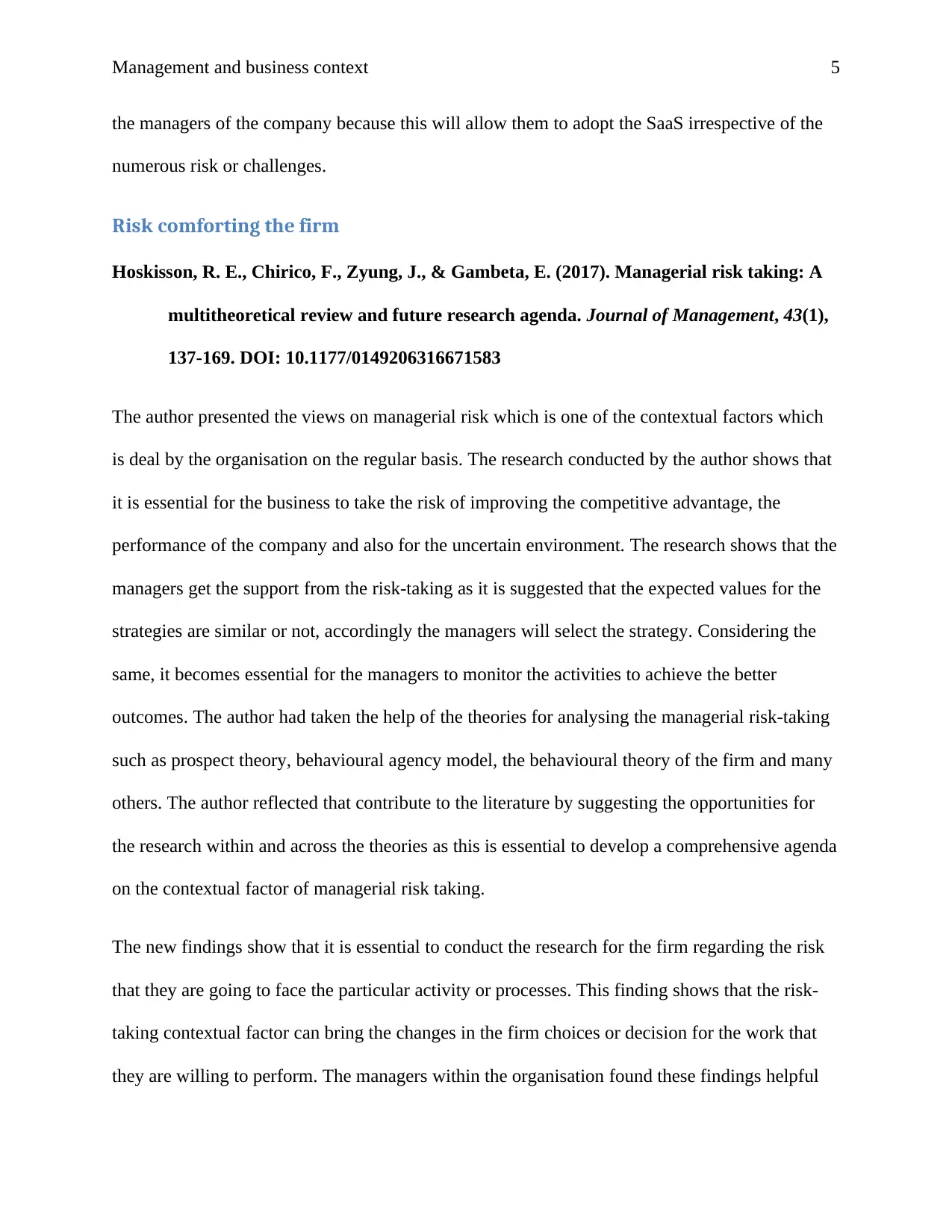
Management and business context 5
the managers of the company because this will allow them to adopt the SaaS irrespective of the
numerous risk or challenges.
Risk comforting the firm
Hoskisson, R. E., Chirico, F., Zyung, J., & Gambeta, E. (2017). Managerial risk taking: A
multitheoretical review and future research agenda. Journal of Management, 43(1),
137-169. DOI: 10.1177/0149206316671583
The author presented the views on managerial risk which is one of the contextual factors which
is deal by the organisation on the regular basis. The research conducted by the author shows that
it is essential for the business to take the risk of improving the competitive advantage, the
performance of the company and also for the uncertain environment. The research shows that the
managers get the support from the risk-taking as it is suggested that the expected values for the
strategies are similar or not, accordingly the managers will select the strategy. Considering the
same, it becomes essential for the managers to monitor the activities to achieve the better
outcomes. The author had taken the help of the theories for analysing the managerial risk-taking
such as prospect theory, behavioural agency model, the behavioural theory of the firm and many
others. The author reflected that contribute to the literature by suggesting the opportunities for
the research within and across the theories as this is essential to develop a comprehensive agenda
on the contextual factor of managerial risk taking.
The new findings show that it is essential to conduct the research for the firm regarding the risk
that they are going to face the particular activity or processes. This finding shows that the risk-
taking contextual factor can bring the changes in the firm choices or decision for the work that
they are willing to perform. The managers within the organisation found these findings helpful
the managers of the company because this will allow them to adopt the SaaS irrespective of the
numerous risk or challenges.
Risk comforting the firm
Hoskisson, R. E., Chirico, F., Zyung, J., & Gambeta, E. (2017). Managerial risk taking: A
multitheoretical review and future research agenda. Journal of Management, 43(1),
137-169. DOI: 10.1177/0149206316671583
The author presented the views on managerial risk which is one of the contextual factors which
is deal by the organisation on the regular basis. The research conducted by the author shows that
it is essential for the business to take the risk of improving the competitive advantage, the
performance of the company and also for the uncertain environment. The research shows that the
managers get the support from the risk-taking as it is suggested that the expected values for the
strategies are similar or not, accordingly the managers will select the strategy. Considering the
same, it becomes essential for the managers to monitor the activities to achieve the better
outcomes. The author had taken the help of the theories for analysing the managerial risk-taking
such as prospect theory, behavioural agency model, the behavioural theory of the firm and many
others. The author reflected that contribute to the literature by suggesting the opportunities for
the research within and across the theories as this is essential to develop a comprehensive agenda
on the contextual factor of managerial risk taking.
The new findings show that it is essential to conduct the research for the firm regarding the risk
that they are going to face the particular activity or processes. This finding shows that the risk-
taking contextual factor can bring the changes in the firm choices or decision for the work that
they are willing to perform. The managers within the organisation found these findings helpful
⊘ This is a preview!⊘
Do you want full access?
Subscribe today to unlock all pages.

Trusted by 1+ million students worldwide
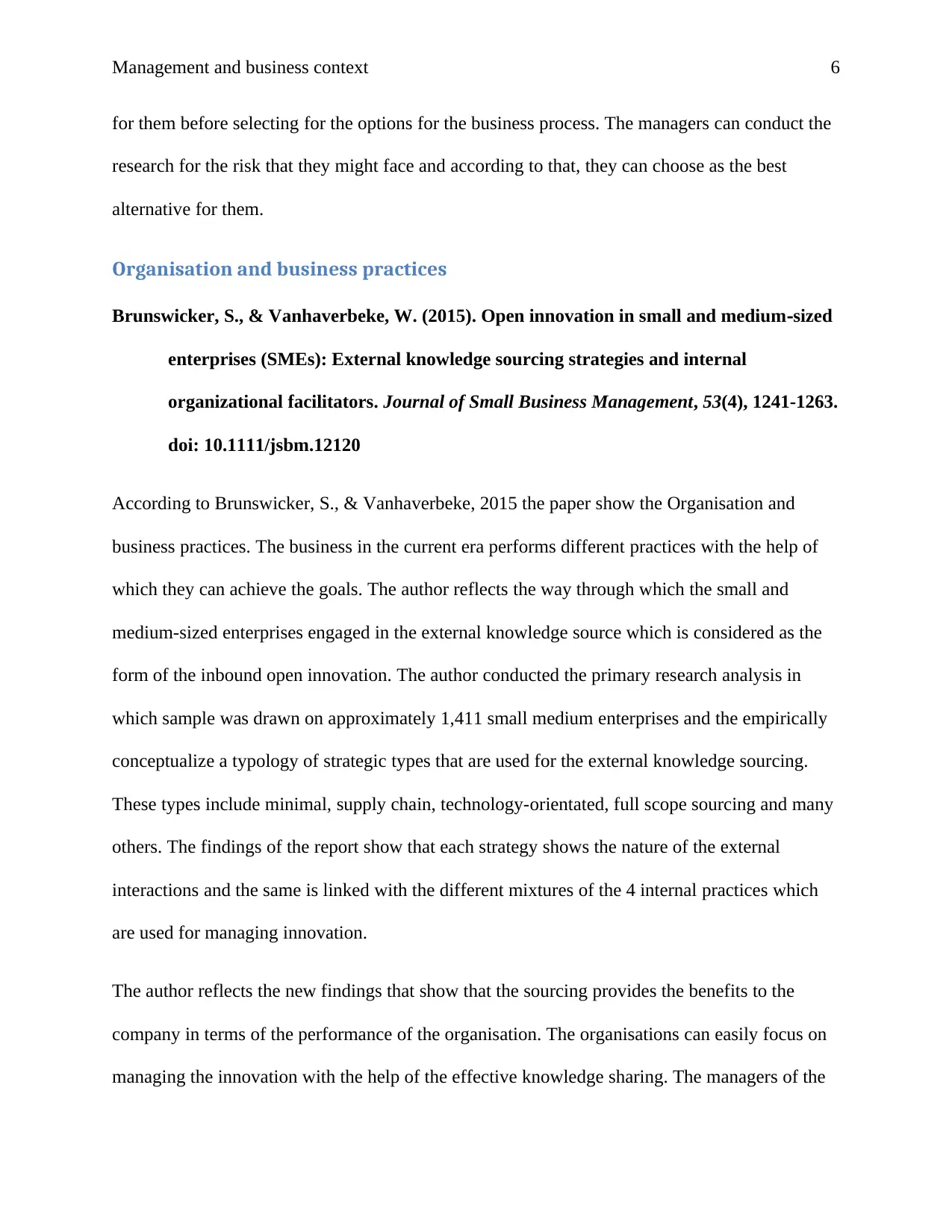
Management and business context 6
for them before selecting for the options for the business process. The managers can conduct the
research for the risk that they might face and according to that, they can choose as the best
alternative for them.
Organisation and business practices
Brunswicker, S., & Vanhaverbeke, W. (2015). Open innovation in small and medium‐sized
enterprises (SMEs): External knowledge sourcing strategies and internal
organizational facilitators. Journal of Small Business Management, 53(4), 1241-1263.
doi: 10.1111/jsbm.12120
According to Brunswicker, S., & Vanhaverbeke, 2015 the paper show the Organisation and
business practices. The business in the current era performs different practices with the help of
which they can achieve the goals. The author reflects the way through which the small and
medium-sized enterprises engaged in the external knowledge source which is considered as the
form of the inbound open innovation. The author conducted the primary research analysis in
which sample was drawn on approximately 1,411 small medium enterprises and the empirically
conceptualize a typology of strategic types that are used for the external knowledge sourcing.
These types include minimal, supply chain, technology-orientated, full scope sourcing and many
others. The findings of the report show that each strategy shows the nature of the external
interactions and the same is linked with the different mixtures of the 4 internal practices which
are used for managing innovation.
The author reflects the new findings that show that the sourcing provides the benefits to the
company in terms of the performance of the organisation. The organisations can easily focus on
managing the innovation with the help of the effective knowledge sharing. The managers of the
for them before selecting for the options for the business process. The managers can conduct the
research for the risk that they might face and according to that, they can choose as the best
alternative for them.
Organisation and business practices
Brunswicker, S., & Vanhaverbeke, W. (2015). Open innovation in small and medium‐sized
enterprises (SMEs): External knowledge sourcing strategies and internal
organizational facilitators. Journal of Small Business Management, 53(4), 1241-1263.
doi: 10.1111/jsbm.12120
According to Brunswicker, S., & Vanhaverbeke, 2015 the paper show the Organisation and
business practices. The business in the current era performs different practices with the help of
which they can achieve the goals. The author reflects the way through which the small and
medium-sized enterprises engaged in the external knowledge source which is considered as the
form of the inbound open innovation. The author conducted the primary research analysis in
which sample was drawn on approximately 1,411 small medium enterprises and the empirically
conceptualize a typology of strategic types that are used for the external knowledge sourcing.
These types include minimal, supply chain, technology-orientated, full scope sourcing and many
others. The findings of the report show that each strategy shows the nature of the external
interactions and the same is linked with the different mixtures of the 4 internal practices which
are used for managing innovation.
The author reflects the new findings that show that the sourcing provides the benefits to the
company in terms of the performance of the organisation. The organisations can easily focus on
managing the innovation with the help of the effective knowledge sharing. The managers of the
Paraphrase This Document
Need a fresh take? Get an instant paraphrase of this document with our AI Paraphraser
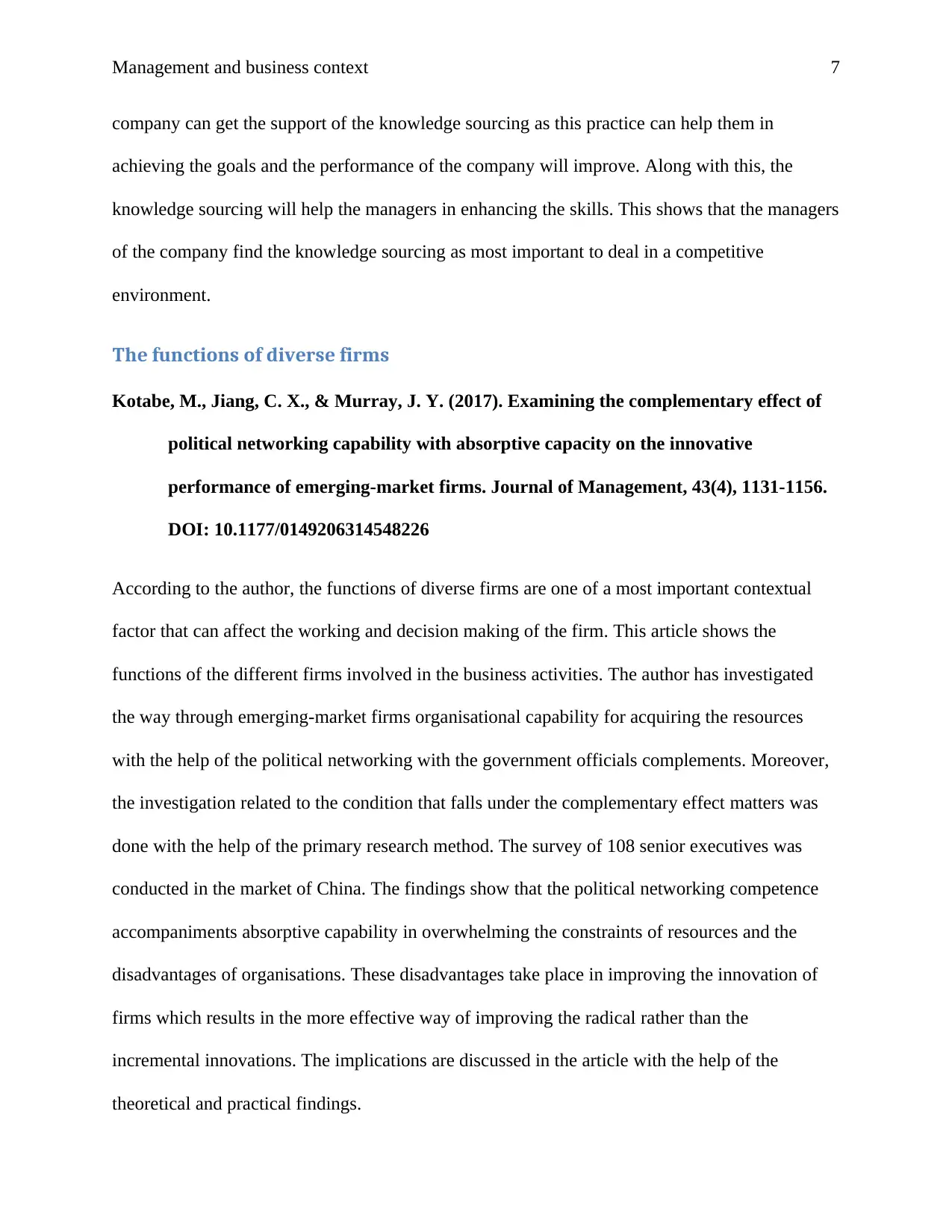
Management and business context 7
company can get the support of the knowledge sourcing as this practice can help them in
achieving the goals and the performance of the company will improve. Along with this, the
knowledge sourcing will help the managers in enhancing the skills. This shows that the managers
of the company find the knowledge sourcing as most important to deal in a competitive
environment.
The functions of diverse firms
Kotabe, M., Jiang, C. X., & Murray, J. Y. (2017). Examining the complementary effect of
political networking capability with absorptive capacity on the innovative
performance of emerging-market firms. Journal of Management, 43(4), 1131-1156.
DOI: 10.1177/0149206314548226
According to the author, the functions of diverse firms are one of a most important contextual
factor that can affect the working and decision making of the firm. This article shows the
functions of the different firms involved in the business activities. The author has investigated
the way through emerging-market firms organisational capability for acquiring the resources
with the help of the political networking with the government officials complements. Moreover,
the investigation related to the condition that falls under the complementary effect matters was
done with the help of the primary research method. The survey of 108 senior executives was
conducted in the market of China. The findings show that the political networking competence
accompaniments absorptive capability in overwhelming the constraints of resources and the
disadvantages of organisations. These disadvantages take place in improving the innovation of
firms which results in the more effective way of improving the radical rather than the
incremental innovations. The implications are discussed in the article with the help of the
theoretical and practical findings.
company can get the support of the knowledge sourcing as this practice can help them in
achieving the goals and the performance of the company will improve. Along with this, the
knowledge sourcing will help the managers in enhancing the skills. This shows that the managers
of the company find the knowledge sourcing as most important to deal in a competitive
environment.
The functions of diverse firms
Kotabe, M., Jiang, C. X., & Murray, J. Y. (2017). Examining the complementary effect of
political networking capability with absorptive capacity on the innovative
performance of emerging-market firms. Journal of Management, 43(4), 1131-1156.
DOI: 10.1177/0149206314548226
According to the author, the functions of diverse firms are one of a most important contextual
factor that can affect the working and decision making of the firm. This article shows the
functions of the different firms involved in the business activities. The author has investigated
the way through emerging-market firms organisational capability for acquiring the resources
with the help of the political networking with the government officials complements. Moreover,
the investigation related to the condition that falls under the complementary effect matters was
done with the help of the primary research method. The survey of 108 senior executives was
conducted in the market of China. The findings show that the political networking competence
accompaniments absorptive capability in overwhelming the constraints of resources and the
disadvantages of organisations. These disadvantages take place in improving the innovation of
firms which results in the more effective way of improving the radical rather than the
incremental innovations. The implications are discussed in the article with the help of the
theoretical and practical findings.
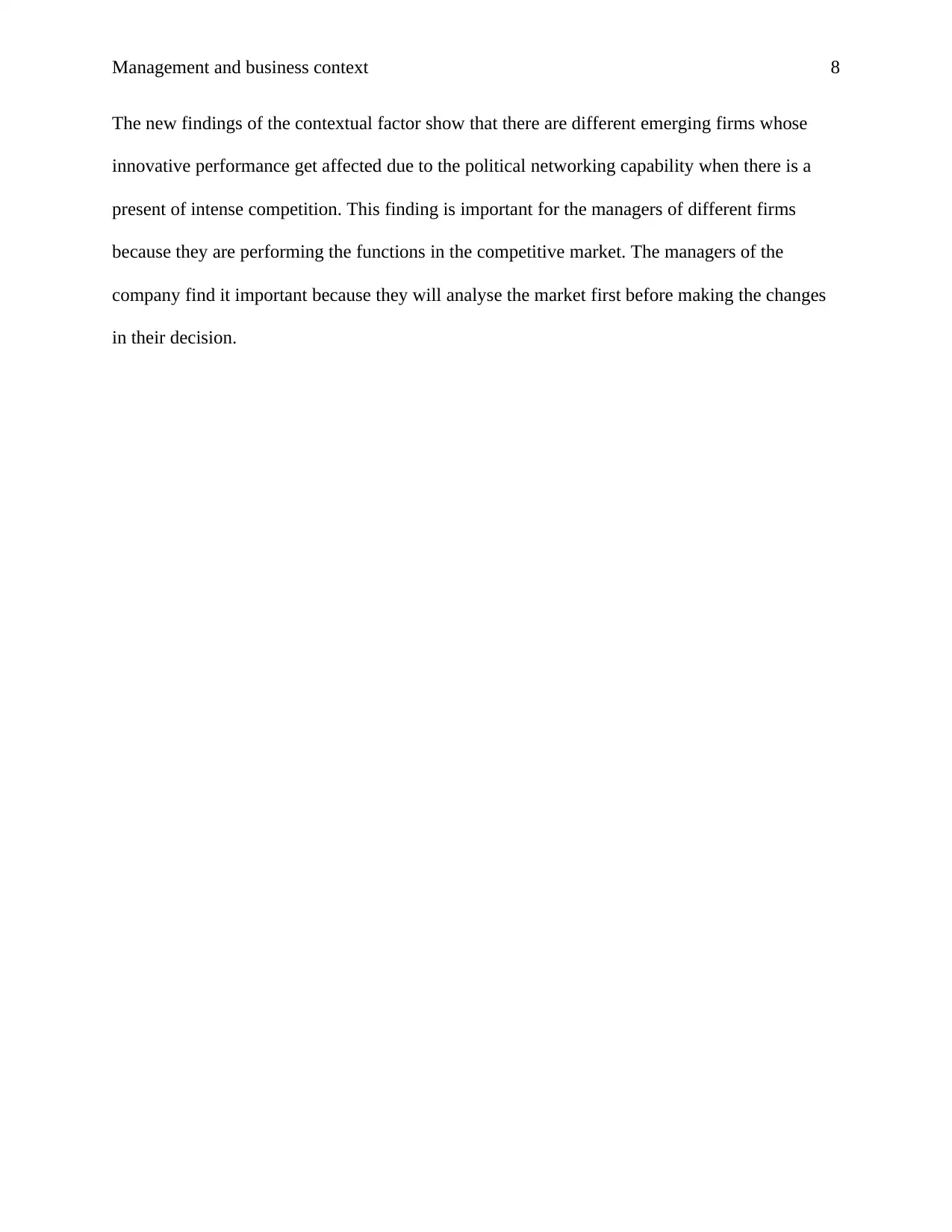
Management and business context 8
The new findings of the contextual factor show that there are different emerging firms whose
innovative performance get affected due to the political networking capability when there is a
present of intense competition. This finding is important for the managers of different firms
because they are performing the functions in the competitive market. The managers of the
company find it important because they will analyse the market first before making the changes
in their decision.
The new findings of the contextual factor show that there are different emerging firms whose
innovative performance get affected due to the political networking capability when there is a
present of intense competition. This finding is important for the managers of different firms
because they are performing the functions in the competitive market. The managers of the
company find it important because they will analyse the market first before making the changes
in their decision.
⊘ This is a preview!⊘
Do you want full access?
Subscribe today to unlock all pages.

Trusted by 1+ million students worldwide
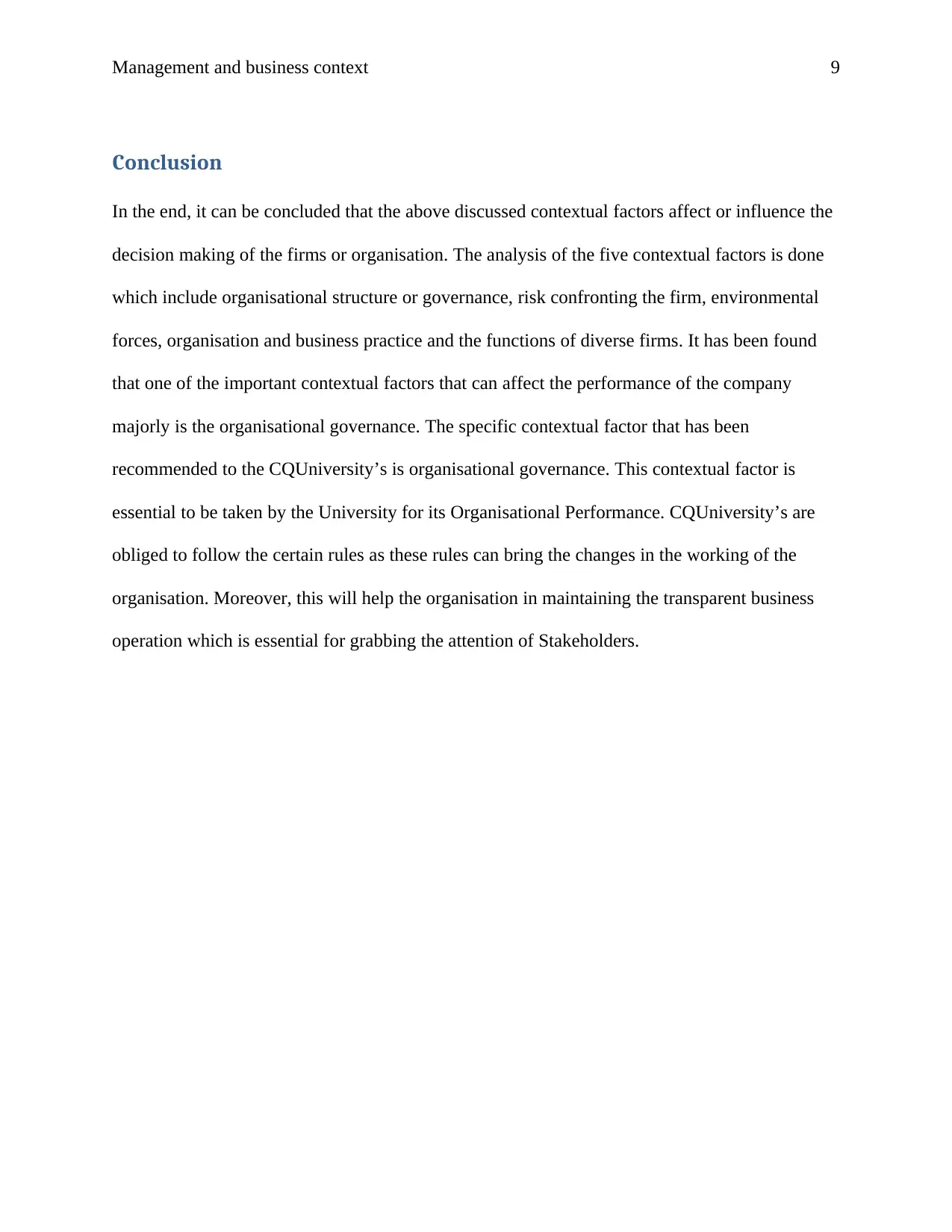
Management and business context 9
Conclusion
In the end, it can be concluded that the above discussed contextual factors affect or influence the
decision making of the firms or organisation. The analysis of the five contextual factors is done
which include organisational structure or governance, risk confronting the firm, environmental
forces, organisation and business practice and the functions of diverse firms. It has been found
that one of the important contextual factors that can affect the performance of the company
majorly is the organisational governance. The specific contextual factor that has been
recommended to the CQUniversity’s is organisational governance. This contextual factor is
essential to be taken by the University for its Organisational Performance. CQUniversity’s are
obliged to follow the certain rules as these rules can bring the changes in the working of the
organisation. Moreover, this will help the organisation in maintaining the transparent business
operation which is essential for grabbing the attention of Stakeholders.
Conclusion
In the end, it can be concluded that the above discussed contextual factors affect or influence the
decision making of the firms or organisation. The analysis of the five contextual factors is done
which include organisational structure or governance, risk confronting the firm, environmental
forces, organisation and business practice and the functions of diverse firms. It has been found
that one of the important contextual factors that can affect the performance of the company
majorly is the organisational governance. The specific contextual factor that has been
recommended to the CQUniversity’s is organisational governance. This contextual factor is
essential to be taken by the University for its Organisational Performance. CQUniversity’s are
obliged to follow the certain rules as these rules can bring the changes in the working of the
organisation. Moreover, this will help the organisation in maintaining the transparent business
operation which is essential for grabbing the attention of Stakeholders.
1 out of 10
Related Documents
Your All-in-One AI-Powered Toolkit for Academic Success.
+13062052269
info@desklib.com
Available 24*7 on WhatsApp / Email
![[object Object]](/_next/static/media/star-bottom.7253800d.svg)
Unlock your academic potential
Copyright © 2020–2026 A2Z Services. All Rights Reserved. Developed and managed by ZUCOL.


